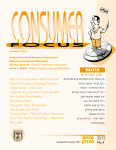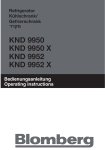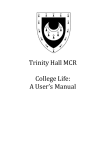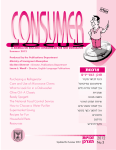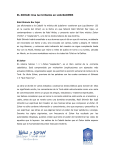Download 2012 No.2
Transcript
Summer 2012 Safe Shopping-Choosing a Bunk Bed Don’t be Left in the DarkCoping with Power Outages The Israel Standards InstituteA Brief Profile כיצד לבחור מיטת קומתיים What to Look for When Choosing Glass Doors התמודדות עם נזקים עקב הפסקת חשמל מכון התקנים הישראלי How to Avoid Credit Card Fraud Health Corner - Avoid Food Poisoning כיצד לבחור דלת זכוכית כיצד למנוע פגיעה עקב זיוף כרטיס אשראי מניעת הרעלת מזון Kitchen Safety- Pressure Cookers סירי לחץ- בטיחות במטבח Know your Rights -The Patients’ Rights Law חוק זכויות החולים Your Dream Vacation Became A Nightmare זכויות הצרכן בנסיעות מדריך לבתי המשפט לתביעות קטנות מקורות סיוע Your Guide to the Small Claims Courts Resources 2012 1 Updated for Summer 2012 No.2 2 A Word from the Editor As smart consumers, we all seek to protect ourselves from shoddy items and from dangerous products. We cannot simply rely on any official agency to do it for us, although credit must be given the bodies that do work intensively for our benefit in ways we may not even be aware. But our first defense, as always, is information. This second issue of ConsumerFocus contains tips for safe purchasing of household items such as bunk beds, surveys your rights as a patient, and profiles how to protect yourself against credit card fraud and damage from power outages. The Ministry of Health offers advice on preventing food poisoning, and Baduk Magazine explains what to do when you finally try to get away from it all and your dream vacation becomes a nightmare. Happy Consuming! Laura Woolf Editor, ConsumerFocus Magazine 3 Safe Shopping Safe Shopping – • Choosing a Bunk Bed • Bunk beds are a popular Israeli solution to the problem of fitting many children into few bedrooms. The market offers many types and models of bunk beds, both locally-made and imported. But whatever your taste and budget, keep in mind that a poorly-made bunk bed is not just a bad investment—it can be extremely dangerous; the risks range from trapping a child’s head or limbs between the slats to complete collapse of one or more of the bunks. • • • • Any bunk bed sold in Israel must receive a quality assurance (tav teken) from the Israel Standards Institute. Before purchasing a bed, ask to see up-to-date certification from the Israel Standards Institute that the bed meets all safety and quality requirements. • • What else should you look for in a bunk bed? The Israel Standards Institute recommends the following: 4 Quality materials (wood or wood-based materials) Uniform structure (sides and edges made of one piece) Security rails on upper bunks on all four sides. They should be no lower than 60-75 millimeters. A sturdy ladder that is securely fastened to the bed. Be sure to check the strength of the frame and connecting hardware. Do this both when purchasing the bed, and on a periodic basis following purchase. Be sure that the bed comes with clear user instructions. Be sure that the surface underneath the mattress allows for some air circulation. A completely sealed bottom is forbidden for use. Be sure that the surface supporting the mattress is securely fastened and stable. It should not wobble or move. Be sure as well that the distance between the bottom support and the bed frame is not more than 25 millimeters. Power Outages unpredictable frequency and duration, and while annoying, especially on those dreary winter days, are usually little more than a temporary inconvenience. Keeping a good supply of candles and matches, a working flashlight, or an emergency lantern on hand can help. To report an outage, call the Israel Electric Company hotline. Power Failures – Don’t Let Them Leave You in the Dark! It’s chilly and rainy outside. You heat some hot chocolate in the microwave, position the lamp just so, adjust the thermostat on the electric heater, and find your favorite movie to watch. Then, just as you’re thinking that life is just about perfect, everything suddenly goes cold, dark, and silent. Sound familiar? Power outages are a fact of life in many parts of the country. They happen with Many electricians recommend that you unplug appliances such as refrigerators and computers to avoid damage in case there is a power surge when the electricity is restored. While unplugging your appliances can help to protect them, this is not always possible or feasible, and a power failure can result in damage. According to the Israel Consumer Council, the Israel Electric Corporation should be responsible for compensation for damage resulting from most types of outages. If the Electric Corporation is not willing to assume responsibility and provide compensation, consult with an expert and receive a written, professional assessment of the damage and its cause. If the expert concurs that the damage is a result of a power outage, you can take your case to a Small Claims Court. Many consumers have successfully claimed compensation from the Israel Electric Corporation in this manner. Israel Electric Company Hotline - 103 www.israel-electric.co.il 5 checks in shops and stores in order to determine that products meet necessary standards. Results of such surveys are often publicized in the media. The Israel Standards Institute – A Brief Profile The Standards Institute offers product testing to the public, several times a year, for products such as microwave ovens. These tests are often free of charge. The Israel Standards Institute (Machon Hatekenim HaYisraeli) is Israel’s official watchdog responsible for preparing and publicizing standards for commercial and industrial products. Grounded in “The Standards Law” (1953) the Institute determines quality standards for both domestic and imported products. At the same time, The Institute represents Israeli interests to international standards bodies. To find out more, visit the Israel Standards Institute website: www.sii.org.il. Together with the Ministry of Trade, Industry, and Labor, the Standards Institute conducts quality The Israeli standard (teken) number 1099 is concerned with the security aspects of glazing in homes, including internal doors within apartment buildings, balcony and garden doors, and roof doors. Institute experts recommend using the following types of glass: 1. Tempered glass: tempered glass (zechuchit mechusemet) shatters into very small pieces that are less likely to cause injury, and do not form sharp shards the way regular glass does when it shatters. 2. Layered Security Glass (zechuchit bitichut shichva’ot): this type of glass is essentially two sheets of glass with a film pasted between them. If this glass is shattered, the shards remain stuck to the film without flying about, thereby minimizing injury. Consumer Bulletin – What You Need to Know About Glass Doors Both esthetic and practical, glass doors are common in many Israeli homes and apartment buildings. But wary consumers should be aware that, according to the Israel Standards Institute, over the past years the number of injuries, and even fatalities, has been climbing, as a result of faulty installation of glass doors. Be sure that your glass doors are insulated to prevent moisture seeping in during the winter, and that you can lock them securely. Some people put small stickers or other markings on very clean glass doors in order to prevent others from walking into them. 6 Credit Card Fraud Protect Yourself From Credit Card Fraud As more people use credit cards for purchasing goods and services, the incidence of credit card fraud or abuse is also on the rise. You can protect yourself by taking just a few basic, easy steps. • • Your first step in keeping yourself and your credit card secure is to carefully examine each monthly statement and be sure that you recognize all entries. If your bank allows access to your account over the Internet, it is even easier to monitor your account on an ongoing basis. • Whenever you pay with a credit card, try not to let the card out of your sight. For example, at the gas station, leave your car if you have to in order to supervise use of your card by the attendant. When you make a credit card purchase that is charged manually, ask for the carbon copy and destroy it. Don’t keep your card’s secret code anywhere in proximity to the card itself. Do not transmit the code to anyone! If the worst should happen and someone does gain access to your card, there are laws to protect you. Familiarize yourself with your rights, and don’t hesitate to exercise them! Here’s what every credit card holder needs to know: • • Notify your credit card company as soon as you realize that someone has been using your card. The law protects you from any liability for charges resulting from abuse of your card once you have notified the company. If you cannot immediately notify the credit card 7 company, your liability is still limited. The law permits a maximum charge of NIS 75 + NIS 30 per day (at the time of publication; check with your credit-card company for updated information) following discovery of fraudulent use of your card until you notify the company, or, alternatively, the amount accrued by the fraudulent use of the card, whichever charge is the lower of the two. In any event, you cannot be held liable for more than NIS 450. The bank must credit your account for funds that were fraudulently withdrawn within 30 days. If the bank or credit card company refuses to compensate you or credit your account, consult with one of the consumer protection organizations for assistance. See the Resource Guide for details. Remember, the law unequivocally states that you cannot be held liable for fraudulent use of a card, for theft of a card, or for abuse of a card! Kitchen Safety Kitchen Safety – Pressure Cookers • Pressure cookers are a great way to prepare food quickly and preserve the nutritional value of cooked food. • • • • A pressure cooker operates on the simple principal of trapping steam inside the pot, hastening the cooking process by significantly raising the temperature. Since the food is cooked quickly, it tends to retain a high rate of vitamins and minerals. At the end of cooking, the pot will “whistle” and release steam through a special stopper. The nature of the presser cooker method means that proper care and handling is necessary in order to avoid accidents and damage. Experts from the Israel Standards Institute recommend the following: • • Whenever you purchase a pressure cooker, be sure that it meets all requirements of the Israel Standards Institute, and that it has updated safety certification from the Institute. Be sure to keep the stopper clean, and free of obstructions. 8 Purchase replacement parts from an authorized importer or dealer only. Make certain that your pressure cooker is accompanied by detailed instructions for use. Do not buy a pressure cooker with any kind of defect. Check that all pieces match the illustrations in the user manual. At the end of cooking, be sure that all the steam has been released before opening the pot. Do not put your hands or face directly over the pot when releasing the stopper, in order to prevent painful steam burns. Kitchen Safety • • • • • • Health Corner Avoid Food Poisoning • Advice from the Ministry of Health on how to avoid food poisoning. Even the most careful shopper or diner is not immune from the risks of contaminated food and food poisoning. Bacteria that cause food poisoning are found on all types of uncooked food, including raw meats, eggs, fruit, and vegetables. If you experience symptoms of food poisoning, including nausea, stomach pain, diarrhea, and fever, consult your doctor for treatment as soon as you can. If you can trace your poisoning to an identifiable source such as a restaurant, you should inform the Ministry of Health (see the Resources Guide). • degrees Celsius. Meat, chicken, and fish that will not be eaten within two days of purchase should be frozen. Thaw frozen meats and fish in the refrigerator or in the microwave. Always wash your hands before and after handling food. Have separate work areas for raw foods and foods that are ready to eat. Be sure that food is cooked thoroughly and served hot. If you can keep your hand on the pot handle for more than a few seconds, it is not hot enough. Store dry foods (flour, rice, pasta, etc.) in airtight containers made of hard plastic or glass. Do not use plastic bags, as all kinds of pests can easily chew through them. Store your containers on high shelves. Be sure to check items for the presence of bugs and other contaminants before use. Beware of purchasing improperly stored foods. Eggs that are improperly handled or stored can cause salmonella poisoning. Babies and the elderly are particularly at risk. Be sure to buy eggs only from air-conditioned shops that sell the eggs in closed, disposable containers. Check that the eggs have a stamp that indicates the name and address of the processing facility, grade of the eggs, and sell-by date. Avoid purchasing cracked or broken eggs. Washing eggs before storing them can cause salmonella bacteria to be absorbed through the shell. If you must wash eggs, do so immediately prior to use. They should be stored in a refrigerator, in their original container if possible. Store eggs for no longer than 30 days. Never used cracked or broken eggs for any other purposes than hard-boiling or for baking. Excerpted from the booklet entitled “Guarding Your Health in Israel,” available from the Publications Department. See the order form at the back. You can avoid food poisoning at home by following Ministry of Health guidelines for proper handling and preparation of food. • Be sure to store all food properly. Your refrigerator thermostat should read at least 5 9 Patients’ Rights Know Your Rights – Patients’ Rights in Israel - The “Patients Rights Law” (1996,) defines the rights of persons requesting or receiving medical treatment, and protects their privacy. Within the framework of this law are several specific clauses. • • The Right to Receive Medical Treatment: Any person in need of medical care is entitled to receive it in accordance with accepted conditions and arrangements for providing medical services in Israel. In emergencies, patients are entitled to urgent care without any preconditions. The Law forbids caregivers or medical institutions to discriminate against patients on the basis of religion, race, gender, nationality, country of origin, or for any other reason. - The Right to Privacy: The right to privacy protects patients from any damage that could result if their medical details were made known, for example, to an employer. Accordingly, a doctor, nurse, or any other health care provider may only release medical information with the patient’s signed permission on a special waiver form. The waiver should indicate exactly to whom the information may be given. The patient must sign a separate waiver for each body allowed access to their information. Medical personnel who violate this Law are subject to prosecution. Doctors may, however, use their judgment in sharing information with a patient’s family. Parents of minors under the age of 18 are entitled to any pertinent medical information regarding their child, and to use that information as they see fit. - The Law requires doctors to report 10 incidences of specific dangerous or contagious diseases to the Ministry of Health. Confidentiality extends to medical records, which must be kept in a secure location that prevents any unauthorized access. No person may add anything, or remove anything, from a patient’s medical record, once the record is signed and dated. Patients are entitled to view sections of their records that contain medical information; they are not, however, always permitted access to sections containing impressions of the caregiver regarding the patient’s behavior or other personal notes. Patients may request copies of their records, but the original records are the property of the health facility • The Right to be Accompanied: Friends or relatives may accompany patients for treatment. Accompanying persons may not interfere in any way with the treatment. • The Right to Receive Medical Care with Dignity: The Law ensures that patients be treated with dignity and respect. • The Right to Refuse Medical Treatment: There are no legal means by which to compel a person to accept unwanted medical treatment. A patient who wishes to refuse treatment must sign a waiver releasing medical staff from liability. This right does not always apply to psychiatric patients, or to other patients who may not be capable of authorizing treatment. The Law does, however, restrict the medical establishment from unjustified use of its authority to curtail the private freedom of psychiatric patients. In emergencies, when patients may not be able to consent to treatment due to their physical or mental condition, emergency room staff can sign a form authorizing emergency lifesaving treatment. Patients’ Rights Complaints and Legal Claims The Public Ombudsman (netziv kvilot hatzibur) of the Ministry of Health is responsible for handling public complaints and inquiries. Any person has the right to file a complaint. Situations that could justify a complaint include refusal to register a person in a health fund, limiting their registration through specific conditions or payments, or cases in which a health fund refuses to provide a service specified as part of the “Basket of Health Services.” The Ombudsman is authorized to recommend appropriate measures to all bodies relevant to the complaint. If you feel that a health-care provider has treated you improperly, you can submit a complaint to the medical director or administration of the relevant institution. File complaints against a health-fund doctor to the supervising district-doctor (rofeh mechozi). Many of the hospitals have public-complaints departments. You can submit your complaint in writing or in person. Include as many relevant details as possible. Legal suits, as opposed to complaints, are warranted when a patient or family member seeks compensation for harm incurred as a result of medical treatment. Lawsuits can be justified in cases when damage results from violation of confidentiality, treatment given without the consent of the patient, contraction of contagious ailments resulting from of poor medical or hygienic conditions, and medical malpractice. It is up to the claimant to prove a connection between the treatment and the damage. Note that while Ministry of Health regulations specify that patients sign a consent form for treatment, it is uncommon to sign for treatment in a clinic or private physician’s office. The patient’s appearance at the clinic is regarded as consent to treatment, and a verbal agreement is generally sufficient. The National Health Insurance Public Ombudsman [email protected] 29 Rehov Rivka *6800 Jerusalem Fax: (02) 5655981 For public inquiries in situations of refusal to register a person in health fund, limiting registration through special conditions or payments, or cases where a health fund refuses to provide a service specified by the Government as part of the “Basket of Health Services.” Public Inquiries [email protected] (02) 5681318 Fax: (02) 6725836 For public inquiries regarding physicians and dentists, the Freedom of Information law, and other inquiries that are not related to the National Health Insurance Law. Da’at – Public Health Information Center. www.hadassah.org.il/hadassa/Heb SubNavBar/ Departments/services/Daat/ [email protected] Da’at offers health information services about medical conditions, medications, treatments, and other issues. Beit Yad Sarah 124 Sd. Herzl Jerusalem (02) 6444500 Society for Patients’ Rights in Israel www.patients-rights.org [email protected] The Society accepts inquiries and complaints about patients’ rights, and provides information services. P.O.B. 6623 Tel Aviv (03) 6022934 Fax: (03) 6021878 Tzvi – Health Consumers Organization www.eshnav.co.il/zvi [email protected] Tzvi serves as an umbrella organization for all patients and their families. P.O.B. 6887 Ramat Gan 11 (03) 5252288 Your Dream Vacation Italian Alps, as well as four nights in Frankfurt, through a travel agency in Israel. According to the agency’s brochure, the Frankfurt hotel charged $106 per night for bed and breakfast. The travel agency also added a service fee of $50 for reserving the room. Your Dream Vacation Overseas Became a Nightmare? To A.G.’s surprise, upon arrival at the hotel in Frankfurt, he discovered that according to the reception manager, the price of a room was only 37 Euros (about $49). In other words, the agency charged A.G. more than twice the regular price. The reception manager agreed that the price charged by the agent was extortionate, and provided A.G. with written authorization of the hotel’s regular price. According to the exchange rate at the time, the difference between the price that A.G. was charged, and the actual price of the room, was some NIS 836, which in A.G.’s opinion was completely unjustified. He accordingly requested a refund of the difference from the travel agency. Here’s what the Law Has to Say Your travel agent promised you a hotel right in the center of things. And you got one, right in the center of the meat-packing district! Okay, there was a pool, just like you wanted. Too bad that no one told you it hasn’t been filled yet. At least the meals were slimming – they were never served! And the air-conditioned car you arranged to rent came fully equipped... with paper fans? What can you do besides laugh it off and hope for a better time next year? The fact is that you do have rights, and there is something that you can do besides gnash your teeth. The agency, in its defense, claimed that it had booked the room through an intermediary agency that processed the reservation and determined the price. In the first agency’s opinion, the price disparity was the responsibility of the intermediary agency. A.G. turned to the Israel Consumer Council, which then requested the first agency to produce a receipt testifying to the transaction between them and the intermediary agency; they were told that no such receipt or any other documentation was available. Further inquiries vindicated A.G.’s claim, and the first agency was obligated to refund the difference in prices, together with interest and cost of living adjustments. If your vacation is ruined because of a failure to honor commitments, poor service, or infringement of your rights, you should consult with one of the consumer organizations, as well as the Travel Agent’s Association, which was set up to help deal with consumer issues. Following is just a sample of some of the cases that have been successfully resolved. A Four-Star Scam The G. family purchased an organized tour of Ireland and Scotland. When they booked the tour, the travel agent offered the option of paying The Price Was a Snow Job! A.G. booked a week-long ski vacation in the 12 Your Dream Vacation According to Mrs. B and her daughter, thanks to the travel agent’s incompetence, they experienced a series of unnecessary problems and aggravation during every part of their trip, forcing them to waste valuable time trying to clarify and arrange matters that were supposed to already have been organized and completed. the basic tour price for 3-star accommodations, or an upgrade to 4-star accommodations for an extra $200 (per person in a double room). The G’s opted to pay extra for the upgraded accommodations. To their amazement, it quickly became clear that their accommodations, as well as those of some 13 other group members who had upgraded, were no different from those who had chosen the 3-star accommodations. All members of the tour shared the same bus, as well as the same hotel, which more often than not turned out to be a 3-star establishment. Take, for example, their arrival at the airport in Beijing, where a local tourism representative was to have met them, transported them to their hotel, and arranged for tours of the city. Despite the fact that the time of their flight’s arrival was known, and even listed in the itinerary provided by the travel agent in Israel, no one was there to meet them in Beijing. Finally, having grown tired of waiting and searching, they telephoned the local travel bureau, which explained that their representative had waited to greet them the previous day, which was the date the Israeli agent had notified them, they would arrive. Upon returning to Israel, irate members of the group who chose to upgrade pointed out to the travel agent that they had paid extra money for services that they never received, and that there was no justification for charging two different prices for the exact same tour package. The angry travelers claimed that the least that they were entitled to was a refund of the difference ($200 per person). Mrs. B. was further upset that the full-day tours of Shanghai and Sichuan that they had been promised turned out to be only half-days. The agreement that someone would meet them at the train and help with their luggage was never fulfilled either. The travel agency disagreed. However, “in the interests of fairness” they offered to refund each claimant $100, on condition that they dropped their claims completely. The G family refused this offer, and filed a complaint with the Travel Agents’ Association. The Association investigated their claim, and as a result, the agency was required to refund the full $200 to each individual, plus filing fees. When Mrs. B and her daughter arrived in Chengdu, a local tourism representative was to have met them with plane tickets and entry permits for Tibet. This was news to the tourist bureau in Chengdu, which had never been informed of this arrangement. A telephone call to the agency’s main office in Beijing revealed that not only were the local agents never meant to supply the tickets and documents, they were not even authorized to do so. A full day was wasted in phone calls between China and Israel trying to make arrangements that were already supposed to have been in place. An Odyssey of Aggravation Mrs. B and her daughter sued a tour agent for defective arrangements on an organized tour, and for the resultant aggravation. The two purchased an organized tour to China, Tibet, Nepal, and India. They specified the places that they wished to visit, and stated that they wanted top-level accommodations. The agent was responsible for arranging flights, hotels, tours with local guides, train transport, visas and entry permits, and local representatives who would meet them on arrival and transport their luggage. Upon arrival in Nepal, Mrs. B and her daughter soon discovered that there, too, their arrival permits had not been arranged, resulting in 13 Your Dream Vacation refused boarding. more wasted time, arguments, and even having to pay a fine. To add insult to injury, the local representative that did meet them had no intention of helping with their luggage. The guide that had been booked for them tried to extort more money each time he was asked to fulfill any of his obligations. Mrs. B’s letter of complaint detailed many more such incidents. Note also that the law permits passengers to claim other damages resulting from being bumped from an overbooked flight. For example, a business traveler that suffers financial damage can sue the airline. Delayed Flights As a result of her complaint to the Travel Agents Association, the Israeli travel agency compensated Mrs. B and her daughter with a free, 11-day trip to Thailand, as well as a 50% discount for an additional person joining them. The trip included round-trip airfare, internal flights, and four-star accommodations. Mrs. B was permitted to choose her preferred dates of travel 30 days in advance. The offer was good for two years. If a flight is delayed for reasons that are not the airline’s fault, such as heavy air traffic or poor weather conditions, the airline is not responsible for compensating passengers. However, if the delay is the fault of the airline, the airline is obligated to pay compensation. Losing your Place on a Chartered Flight The law prohibits organizers of chartered flights from selling one person’s seat on a flight to another passenger for a higher price. If a charter company is forced to cancel or delay a flight because there are not enough passengers, or to combine one flight with another, resulting in a loss of services that passengers were to have received, the passengers are entitled to compensation for those services. In addition to the kinds of situations described above, the consumer organizations and the Travel Agents Association regularly deal with such common travel-related complaints such as overbooked and delayed flights, lost luggage, and substandard accommodations. Overbooked Flights Over the past few years, it has become increasingly common for travelers to arrive at the airport only to discover that their flight is already full because it was overbooked. Lost Luggage If a passenger’s luggage is lost or damaged during a flight, the airline is responsible for paying compensation. The law limits the amount of compensation to some $20 per kilo. Due to the high costs of air transport, special legislation permits airlines to overbook flights, and to prevent passengers from boarding. However, the law also entitles passengers to compensation of $50-200, and not less than half the cost of the flight, as well as compensation for expenses such as storage of baggage, telephones, etc. upon presentation of receipts. Compensation is on condition that the passenger reserved a seat on the overbooked flight, and that alternative arrangements can not be made within a reasonable period. The airline is obligated to make this information known to passengers The airlines themselves will often claim that the airport ground-service luggage handlers are responsible for any lost or damaged luggage. The law requires service companies to take measures to ensure luggage at the airport. To minimize your risks, be careful to hold on to your luggage claim ticket, and immediately report any lost luggage to the airline. Be sure to ask for confirmation of your lost-luggage report. If you file a claim for compensation, you should file it against the airline, the ground services company, and the 14 Your Dream Vacation airport. If it is not clear who was responsible for the loss, the court may obligate all three parties to compensate you. Unsatisfactory Tour Guides Your tour guide is a key element in an organized tour. A good guide, who is friendly and informative, can help smooth many of the rough edges of an organized trip, and make it a success. On the other hand, even if you do not personally hit it off with your guide, as long as his professional knowledge meets a reasonable standard you don’t really have a basis for complaint. But if the guide is incompetent or unknowledgeable, or runs the tour in a defective way and provides substandard service, you are entitled to file a claim for compensation. The consumer organizations also point out that if your luggage contains an item of unusual value, for example an Oriental carpet, it is a good idea to notify the airline when you check in, and to arrange for special insurance. This helps you to avoid the problems of limited compensation from the airline. Unsatisfactory Hotels Some travelers rate a good hotel as one of the key factors of a vacation, and consider comfort and indulgence a necessity. Others see a hotel as a place to put their head down at night, and don’t really care about the frills as long as the place is clean and quiet, or is conveniently located. Dissatisfaction with a Tour A successful tour is the result of many factors all working together, and when someone claims they “are not satisfied” with a tour, they need to be specific. If your fellow travelers are unpleasant, there is little you can do. It is not the tour organizer’s fault or responsibility when other people talk too much, or are consistently late for the bus. Inclement weather or strikes at a location on your itinerary are unfortunate, but again, not the organizer’s responsibility. Travel agents can claim that they are not responsible for any defects in a hotel, and that a disgruntled guest should claim any damages against the hotel. But this is not always the case. If the travel agent was incompetent in making your arrangements, and books you into a hotel known to be substandard, this can be regarded as a violation of your agreement, and you could justifiably file a suit. On the other hand, foul-ups that the organizer is responsible for can justify a claim for compensation. For example, if the organizer promised an air-conditioned bus or a specific number of meals, and these items are not in fact provided, or if a visit to a promised attraction does not take place because the guide failed to secure tickets, the organizer can be considered in breach of contract, and is liable for compensation. For example, if you have been guaranteed a fourstar hotel and you find yourself staying in a threestar establishment, or in one without a pool and exercise room, even if they have been promised, it is your right to transfer to a better hotel, and to claim damages from the party responsible for violating the agreement. Be sure to save all copies of documents relevant to your trip (timetables, receipts, etc.) as well as all guarantees from the tour organizer. In other cases, you can ask the hotel to upgrade your conditions. For example, if you were guaranteed a room on a specific floor, a room with a view, or a non-smoking room, and you do not receive it, you are within your rights to ask the hotel to make the necessary adjustments. Poor Airline Service Regulations regarding airline security are very strict. Pleasant behavior and efficient service are a requirement of a flight attendant’s job. 15 Your Dream Vacation information on services not included in the cost of the package. 4. Details of the accommodations and their rating. 5. The number of daily meals. 6. The itinerary of the tour, and the places to be visited. 7. Transportation in Israel and abroad, including internal flights and ground or water transport, as well as the name of the airlines. 8. All information relevant to entry into the overseas destinations on the itinerary, including information on visas, entry permits, and other requirements. 9. Guarantees of security of payments. 10. Payment deadlines and conditions. 11. The conditions according to which the tour can be cancelled. 12. Conditions of refund of payments in the event that the organizer cancels the tour, and the refund procedure. 13. Conditions of cancellation on the part of the purchaser, including penalty fees. 14. A list of agency representatives located at the destinations of the tour, including addresses, telephone and fax numbers, public reception hours, and the types of aid they can offer. 15. If an unaccompanied minor participates in the tour, the agency must provide the parents or guardians with information on how to contact the minor. Any time, however, that a flight attendant asks a passenger to return to their seat, turn off an electronic device, or to fasten a seatbelt, they are fulfilling a necessary and important safety function. Nevertheless, if an attendant speaks rudely or aggressively, or behaves discourteously, the passenger may file a complaint with the airline. Protect Yourself Before spending money on a tour package, keep the following tips in mind. 1. Before making any payment, make sure that the agency provides you with written details of your package. 2. Check that the quoted prices include such items as port taxes, levies, visa fees, etc. 3. Find out whether the price you are paying is linked to dollars, Euros, or other currency, and find out how the price is calculated. Try to investigate the accommodations being offered, and how they are rated. Search the internet for reviews from other travelers. Verify the number of meals you will receive each day. Find out what the itinerary will be, and which attractions you will visit. Check whether the price of the tour covers entrance fees to attractions. 4. Verify what the cancellation fees and deadlines are. The Travel Agents Association www.ittaa.org.il [email protected] (03) 5269104 The law requires directs all travel agents or organizations to provide the following information, in writing, to any person who purchases a travel package: 1. The total cost of the package, including taxes, fees or any other costs that the purchaser must cover, in Israel and abroad. 2. The currency to which the cost of the package is linked, how the exchange rate is calculated, and the amount of interest if the payment is made in installments. 3. The components of the package, including From “Baduk” magazine # 40 16 Small Claims Court number (mispar zehut). You need to submit at least three copies of the claim sheet to the Small Claims Court. You retain one copy, and one is sent to the defendant. Ensure that your copy is stamped ‘received’ (‘nitkabel’) and dated. For each additional defendant or witness, you will be required to submit an additional copy of the form. You must attach copies of all of your supporting documents to each copy of the form. Your Guide to the Small Claims Court • • • Small Claims Courts (Batei HaMishpat LeTviot Katanot) hear civil suits for monetary sums not exceeding a set maximum. Consumers can file suits in Small Claims Court for compensation when contracts or terms of sale are violated, for the exchange or repair of a product, or the cancellation of a transaction. You can file a small claim at the Magistrates’ Court whose jurisdiction applies to one of the following locations: - the place of residence or place of business of the defendant. - the location in which liability was engendered, i.e. the place where a contract was signed. - the site intended for the fulfillment of liability. - the location at which the asset or property was transferred. - the location at which the act or oversight for which the claim was filed was committed. You can obtain claims forms (ktavei tvia) and statement of defense forms (ktav hagana) free of charge at the Court Secretariat office of any Small Claims Court. You can also download them from www.court.gov.il. The fee for filing a claim is a percentage of the monetary amount of the claim. You must pay the fee by purchasing and affixing ‘income stamps’ (bulei hachnasa) to the form. You can purchase income stamps at any post office branch. Be sure to attach any documents that support your claim to the form, including receipts, professional opinions and appraisals, and prior correspondence. Make sure that the defendant is a legal entity, i.e. an individual or a corporation. Write the full name and address of the person or company clearly and precisely. If possible, indicate the individual’s father’s name and identity • On the day of your court proceedings, bring all relevant documents, as well as any witnesses. If you summon a witness to testify who refuses to appear, you may obtain a subpoena that will require that witness to testify. • Neither the plaintiff nor the defendant is entitled to representation by an attorney or any other envoy before a Small Claims Court. Parties are free to seek legal counsel before the proceedings, and an attorney may assist in the preparation of claims and statements of defense. • You can appeal a verdict of a Small Claims Court within 15 days. Send your appeal in writing, along with a copy of the verdict, to a District Court judge. • In order to implement a court decision, send the liable party a written request for the compensation ordered by the court (be sure to retain a copy for yourself.). If the liable party ignores the request, or refuses to pay, you may open a file for enforcement of a court ruling. Bring a copy of the verdict, certified by the court that handed it down, to an Enforcement Bureau (Lishkat HaHotza’a LePoal). Fill out a form detailing the liable party and the steps you would like taken against them. You must also pay a fee, which is added to the compensation already awarded you, along with any other expenses involved in enforcing the verdict. See also ”Know Your Rights! The Hotza’a LePoal” ConsumerFocus #6 Summer 2010. The Hotza’a LePoal www.eca.gov.il Information Line *35592 17 Resources This directory is a general guide to the resources that are available to consumers. Note that the Ministry of Immigrant Absorption does not recommend or endorse any particular body or service. It is up to each individual to investigate and decide upon the most appropriate source of assistance. The Israel Standards Institute www.sii.org.il [email protected] The Israel Standards Institute formulates standards for a variety of products, and tests products manufactured both locally and overseas. The Institute’s website contains a large number of articles containing consumer information (in Hebrew). Several times a year, the Institute offers testing of specific products, such as microwave emissions. In many cases, these tests are free of charge. The Director of Consumer Protection Ministry of Industry, Trade, and Labor (Hamemuneh LeHaganat HaTzarchan) www.tamas.gov.il [email protected] The Director of Consumer Protection is responsible for enforcing the ‘Consumer Protection Law’ of 1981. This includes prohibitions against misleading consumers, against exploiting consumers in distress, and against misleading advertising. The law also applies to consumer information, regulation of advertising directed at children, regulation of product labeling, and protection against fraud in door-to-door sales, sales of vacation apartments, and sales by telephone or other electronic means. 5 Rehov Bank of Israel Jerusalem 94190 Switchboard Public Inquiries Public Inquiries -Government Ministries Bank of Israel www.bankisrael.gov.il [email protected] (02) 6662590 Complaints about Banking Services and Information on Banks: Public Complaints Officer, Banking Supervision Dept. P.O.B. 780, Jerusalem 1212-200680 [email protected] Fax: (02) 6669077 The Israel Consumer Council www.consumers.org.il [email protected] The Israel Consumer Council was established by the Ministry of Industry and Trade in order to protect consumer rights and respond to individual consumer complaints. P.O.B. 20412 Tel Aviv 61200 (03) 6241035 Israel Electric Company Hotline www.iec.co.il 103 (03) 6465154 (03) 6465130 Israel Lands Administration www.mmi.gov.il [email protected] Public inquiries about property registration. Main Office (02) 6208422 Ministry of Agriculture and Rural Development www.moag.gov.il (02) 6290188 [email protected] Complaints about prices of agricultural products. 18 Resources Ministry of Communications Bezek Telephone Company 199 Service Center Line Fax: 198 The Ministry of Immigrant Absorption Public Inquiries about Cable and Satellite Television (02) 6702210 National Telephone Information Center (03) 9733333 Public Inquiries about the Postal Banks Public Inquiries (02) 6752765 www.klita.gov.il [email protected] (02) 6702237 Israel Postal Authority www.israelpost.co.il Southern and Jerusalem District Headquarters 31 Rehov Zalman Shazar (08) 6261216 Beer Sheva Information Line on postal rates, postal codes, and posting packages: 171 Public Inquiries: 1-599-500-171 Haifa and Northern District Headquarters 15 Rehov HaPalyam (04) 863111/6 Haifa See the website for information on rates, to check postal codes, for locating branch offices, and other information. Ministry of Construction and Housing www.moch.gov.il (02) 5847549 1-599-505-404 Registrar of Contractors Public inquiries about contractors listed in the Register, on issues of faulty construction, work delays, etc. (02) 5847847 Fax: (02) 5847148 The Ministry of Health www.health.gov.il 2 Rehov Ben Tabai POB 1176 Jerusalem 1-599-500-923 Publications Department Fax: (02) 6241585 Tel Aviv and Central District Headquarters 6 Rehov Esther Hamalka (03) 5209112 Tel Aviv Public inquiries about housing assistance. Telemesser: Public Inquiries Jerusalem District Office 15 Rehov Hillel (02) 6705705 19 Resources Rehov Alchadaf Tiberias (04) 6710300 The Ministry of Tourism www.tourism.gov.il 52 Rehov HaPalmach Tzfat (04) 6994222 You can submit complaints about hotels or other tourist services to the Ministry’s main office, or through their website. National Food Service (Sherut Mazon Artzi) [email protected] 14 Rehov HaArba'a Tel Aviv 64739 5 Rehov Bank of Israel, Jerusalem (02) 6664200 (03) 5634706 The Ministry of Transportation and Road Safety www.mot.gov.il The Ministry of the Interior National Telephone Information Center Public Inquiries [email protected] *3450 (02) 6294750 The Telephone Information Center provides information on Ministry of the Interior services, service locations, and required documents. You may certain services including birth certificates, burial licenses, and other documents by telephone. Public Inquiries [email protected] (03) 9545400 Fax: (03) 9545450 For all questions regarding issuance and renewal of drivers' licenses and vehicle administration. 1-222-56-78/*5678 (02) 6294701 Public complaints about public transportation (buses and taxis) 5 Rehov Bank of Israel, Jerusalem Fax: (02) 6294750 The Ministry of National Infrastructures www.mni.gov.il [email protected] Public inquiries about distribution of fuel. Public Inquiries and Information [email protected] (02) 6663222/3333 Computerized Information Center of the Ministry of Transport Population Administration Public Inquiries Head Office 6 Rehov Misillat Yisharim, Jerusalem 5 Rehov Bank of Israel, Jerusalem 94340 quality, price, and (04) 8660189 20 Fax: (02) 6663199 8 Rehov HaMalacha, Tel Aviv Fax: (03) 5657216 15 A Sd. Palyam, Haifa Fax: (04) 8632029 Resources You can also submit complaints via the Ministry website. Municipal Authorities 105/6/7 Non-profit and Voluntary Organizations The following organizations accept public complaints and offer advice and assistance with consumer issues. When contacting an organization, be sure to have all relevant documents, including agreements, receipts, and any written communication with the company, merchant, or corporation. Public inquiries about water supplies and water pressure, pipe damage, environmental pests, and other infrastructure issues. The Public Ombudsman of the State Comptroller’s Office (02) 6705111 Consumer Protection Authority of the Histadrut 93 Rehov Arlozorov, Tel Aviv (03) 6921235 www.mevaker.gov.il [email protected] Emun HaTzibur www.emun.org Public inquiries regarding government services, the Postal Authority, the State Lottery, universities, and other public bodies. Emun HaTzibur strives to make information available to the public about the reliability and quality of services and products, conformity to laws, customer service, etc. 12 Rehov Omar El Kayam Hadar Hacarmel, Haifa (04) 8604444 POB 4394 31043 Fax: (04) 8604446 12 Rehov Beit Hadfus Givat Shaul, Jerusalem POB 669 19 Rehov HaArba’a Tel Aviv POB 7024, 61070 8b Rehov Henrietta Szold Beer Sheva Israel Consumers’ Association (Independent) 35 Rehov HaMelech George, Tel Aviv (03) 5285228 Fax: (03) 5259332 (02) 6665000 Fax: (02) 6665204 Israel Consumers Council www.consumers.org.il Tel Aviv (03) 6844000 Fax: 6851512 (03) 6241034 Religious Consumers’ Organization P.O.B. 69, Bnai Brak (03) 5793337 Women Against Offensive Advertising Contact the Israel Women’s’ Network www.iwn.org.il [email protected] (08) 6232777 Fax: (03) 6851512 Activists identify and respond to advertisements that are offensive or harmful to women and girls. They send letters and apply public pressure on the advertisers to remove the offensive advertisement. 8 Rehov Hata'ash, Ramat Gan (03) 6123990 21 Other Available Publications The following booklets are available from the Publications Department. To order, simply indicate the booklets you wish to receive and return the order form to the Publications Department, English Section, Ministry of Immigrant Absorption, 15 Rehov Hillel, Jerusalem 94581. The publications will be mailed to you free of charge. Guide for the New Immigrant The Absorption Basket Absorption First Steps Employment Education Guarding Your Health in Israel A Guide to Services for the Disabled A Guide to Transportation in Israel A Guide to Ulpan Study Health Services in Israel Housing The Life Cycle in Israel Military Service National Insurance Institute Retirees Accountants Artists, Writers, and Athletes Computer and Hi-Tech Professionals Engineers and Architects Lawyers Medical Professionals Nurses Psychologists Scientists and Researchers Social Workers Teachers Assistance to Victims of Enemy Actions Registering for a Health Fund Information for Olim Newspaper Shiluv Magazine Name ___________________________ Address __________________________ Postal Code ______________________ Date _____________ 22 A moment of your time! In order to improve the level and usefulness of the material presented in this booklet, we would appreciate it if you would answer the following questions: 1. Where did you get “ConsumerFocus Magazine?” Airport Ministry of Immigrant Absorption Other (specify) 2. To what extent did this booklet provide you with the information that you needed? (1 is the lowest rating, 5 is the highest rating) 1 2 3 4 5 Comments _________________________________ 3. Please rate the following areas from 1 to 5 (5 being the highest rating) Clarity of the Text 1 2 3 4 5 Sufficiency of Details 1 2 3 4 5 Design of the Brochure 1 2 3 4 5 Usefulness of the Brochure 1 2 3 4 5 4. We would appreciate the following information for statistical purposes: Profession _____________ Gender M F Age ___________ Country of Origin _________________ Year of Aliyah ______ Place of Residence ____________________ Date ____________ Please send the completed questionnaire to the Ministry of Immigrant Absorption, Publications Department, English Section, 15 Rehov Hillel, Jerusalem, 94581, or by fax to (02) 6241585. You can also place this questionnaire in the public suggestions box at an office of the Ministry of Immigrant Absorption nearest you. Thank you for your cooperation. Best wishes for an easy and successful absorption! הופק על ידי אגף מידע ופרסום המשרד לקליטת העלייה 94581 ירושלים15 רח’ הלל © כל הזכויות שמורות Produced by the Publications Department The Ministry of Immigrant Absorption 15 Rehov Hillel, Jerusalem 94581 © All rights reserved www.klita.gov.il e-mail: [email protected] 0116212020 מק”ט הודפס על ידי המדפיס הממשלתי
























